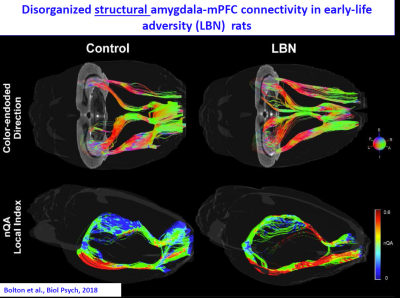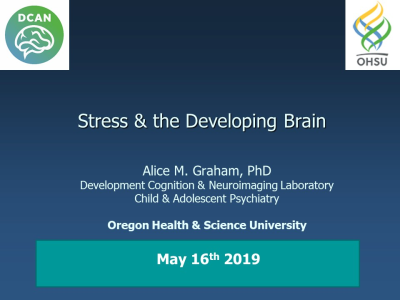Stress & the Developing Brain
Stress & the Developing Brain
Weekday Course
Weekday Course
ORGANIZERS: Christopher Smyser, Andre Obenaus
Thursday, 16 May 2019
| Room 512A-H | 08:15 - 10:15 | Moderators: Hao Huang, Tomoki Arichi |
Skill Level: Basic to Advanced
Session Number: TH-02
Overview
This course focuses upon application of neuroimaging to study the effects of early-life stressors and psychosocial adversity on early structural and functional connectivity development. The session begins by discussing the current state of the field and the effects of premature birth on brain development. Approaches and results from investigations employing advanced neuroimaging techniques to study the effects of early life stress and psychosocial adversity across laboratory and clinical settings will be discussed. The session will also include discussion of how neuroimaging can be used to investigate the integrated relationship between environmental and genetic risk for neurodevelopmental disorders and psychopathology, an area of increasing interest in the field.
Target Audience
M.D.'s, Ph.D.'s, and trainees who are interested in applying multimodality neuroimaging techniques to understand the effects of premature birth, early life stressors and psychosocial adversity on structural and functional brain development.
Educational Objectives
As a result of attending this course, participants should be able to:
- Describe the current state of knowledge and neuroimaging approaches for investigation of structural and functional connectivity in the developing brain;
- Discuss results from recent investigations detailing the effects of stress and psychosocial adversity on the developing brain across laboratory and clinical environments; and
- Apply neuroimaging techniques to better understand the intersection between environmental and genetic risk factors on early brain development.
Overview
This course focuses upon application of neuroimaging to study the effects of early-life stressors and psychosocial adversity on early structural and functional connectivity development. The session begins by discussing the current state of the field and the effects of premature birth on brain development. Approaches and results from investigations employing advanced neuroimaging techniques to study the effects of early life stress and psychosocial adversity across laboratory and clinical settings will be discussed. The session will also include discussion of how neuroimaging can be used to investigate the integrated relationship between environmental and genetic risk for neurodevelopmental disorders and psychopathology, an area of increasing interest in the field.
Target Audience
M.D.'s, Ph.D.'s, and trainees who are interested in applying multimodality neuroimaging techniques to understand the effects of premature birth, early life stressors and psychosocial adversity on structural and functional brain development.
Educational Objectives
As a result of attending this course, participants should be able to:
- Describe the current state of knowledge and neuroimaging approaches for investigation of structural and functional connectivity in the developing brain;
- Discuss results from recent investigations detailing the effects of stress and psychosocial adversity on the developing brain across laboratory and clinical environments; and
- Apply neuroimaging techniques to better understand the intersection between environmental and genetic risk factors on early brain development.
| 08:15 |
Structural & Functional Connectivity in the Developing Brain: State of the Field & Effects of Premature Birth
Gareth Ball
Recent advances in neuroimaging have allowed unprecedented insight into the structural and functional organisation of the newborn brain. Advanced image analysis methods allow the modelling and interrogation of brain development through the lens of network analysis, fostering an understanding of the emergence and advancement of connectivity in the neonatal brain. Premature birth, and subsequent early exposure to the extra-uterine environment, can be viewed as an extreme stressor to the developing brain. The long-term adverse impact of premature birth is well established, with lower gestational age at birth correlated to poor motor, cognitive and health outcomes. In this talk, I will outline the current approaches for investigating structural and functional connectivity in the newborn brain and describe the impact of preterm birth on brain network organisation.
|
|
| 08:45 |
 |
Stress & the Developing Brain: Lessons from the Lab
Tallie Z. Baram
There is compelling evidence from human studies and experimental models that stress or adversity during developmental sensitive periods influences brain maturation, with major cognitive and emotional consequences. However, what exactly stress is, how the developing brain senses it, and how the 'stress-signals' act to influence brain circuit maturation has remained unclear. We will employ neurobiological principles and combined neuroimaging, molecular and behavioral approaches to address these critical questions: we need the answers in order to intervene and prevent aberrant circuit developement and function that promotes vulnerabilities to mental and cognitive disorders.
|
| 09:15 |
 |
Stress & the Developing Brain: Lessons from the Clinic
Alice Graham
This session addresses the use of structural and functional MRI to study the mechanisms through which the early environment influences risk for psychiatric disorders. Learning objectives are as follows: (1) Understand the concept of developmental programming; (2) Identify mechanisms through which prenatal conditions can influence the developing brain; (3) Learn how functional and structural MRI with infants has been used to advance understanding of developmental programming; and (4) Understand the potential for clinical intervention research to lend an experimental framework to the study of early human brain development.
|
| 09:45 |
The Effects of Poverty on the Developing Brain
Pilyoung Kim
|
|
| 10:15 |
Adjournment |
 Back to Program-at-a-Glance |
Back to Program-at-a-Glance |  Back to Top
Back to Top